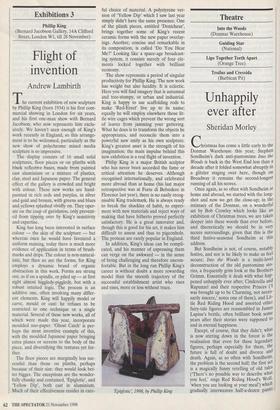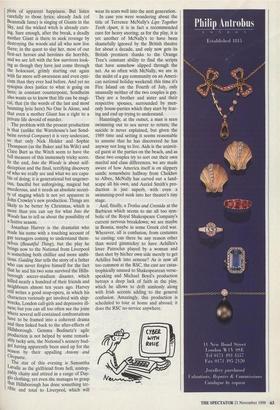Theatre
Into the Woods (Donmar Warehouse) Guiding Star (National) Lips Together Teeth Apart (Orange Tree) Troilus and Cressida (Barbican Pit)
Unhappily ever after
Sheridan Morley
Christmas has come a little early to the Donmar Warehouse this year; Stephen Sondheim's dark anti-pantomime Into the Woods is back in the West End less than a decade after it folded somewhat abruptly in a glitzier staging over here, though on Broadway it remains the second-longest running of all his scores. Once again, as so often with Sondheim at home and abroad, we started with the long- shot and now we get the close-up; in the intimacy of the Donmar, on a wonderful set by Bob Crowley which looks like an exhibition of Christmas trees, we are taken deeper into these woods than ever before, and theoretically we should be in very secure surroundings, given that this is the third festive-seasonal Sondheim at this address.
But Sondheim is not, of course, notably festive, and nor is he likely to make us feel secure; Into the Woods is a multi-level deconstruction of the old pantomime sto- ries, a frequently grim look at the Brothers Grimm. Essentially it deals with what hap- pened unhappily ever after; Cinderella and Rapunzel and their respective Princes CI was brought up to be Charming, not neces- sarily sincere,' notes one of these), and Lit- tle Red Riding Hood and assorted other fairy-tale figures are reassembled in James Lapine's brittle, often brilliant book some years after their stories were supposed to end in eternal happiness. Except, of course, that they didn't; what is now stirring down in the forest is the realisation that even for these legendary figures, perhaps especially for them, the future is full of doubt and divorce and death. Again, as so often with Sondhelm, the problem is the second half; the first act is a magically funny retelling of old tales (`There's no possible way to describe what you feel,' sings Red Riding Hood's Wolf, `when you are looking at your meal') which gradually interweaves half-a-dozen panto plots of apparent happiness. But listen carefully to those lyrics; already Jack (of Beanstalk fame) is singing of Giants in the Sky, and the wicked witch is already curs- ing. Sure enough, after the break, a deadly mother Giant is there to seek revenge by destroying the woods and all who now live there; in the quest to slay her, most of our first-act heroes and heroines die horribly, and we are left with the few survivors look- ing as though they have just come through the holocaust, grimly starting out again with far more self-awareness and even cyni- cism than they ever had before. And yet no synopsis does justice to what is going on here; in constant counterpoint, Sondheim also wants us to know that life can be magi- cal, that (in the words of the last and most haunting lyric here) No One Is Alone, and that even a mother Giant has a right to a private life devoid of murder.
The problem with the present production is that (unlike the Warehouse's last Sond- heim revival Company) it is very undercast, so that only Nick Holder and Sophie Thompson (as the Baker and his Wife) and Clare Burt as the Witch seem to have the full measure of this immensely tricky score. In the end, Into the Woods is about self- deception and the final, terrifying discovery of who we really are and what we are capa- ble of doing; it is generational but ungener- ous, fanciful but unforgiving, magical but murderous, and it needs an absolute securi- ty of staging which is not yet apparent in John Crowley's new production. Things are likely to be better by Christmas, which is more than you can say for what Into the Woods has to tell us about the possibility of a festive season.
Jonathan Harvey is the dramatist who made his name with a touching account of gay teenagers coming to understand them- selves (Beautiful Thing), but the play he brings now to the National from Liverpool is something both chillier and more ambi- tious. Guiding Star tells the story of a father who can never forgive himself for the fact that he and his two sons survived the Hills- borough soccer-stadium disaster, which killed nearly a hundred of their friends and neighbours almost ten years ago. Harvey still writes a good soap-opera, in which his characters variously get involved with ship- wrecks, London call-girls and depressive ill- ness; but you can all too often see the joins where several self-contained confrontations have to be framed into a coherent drama and then linked back to the after-effects of Hillsborough. Gemma Bodinetz's agile production is not helped by some remark- ably tacky sets, the National's scenery bud- get having apparently been used up for the season by their appalling Antony and Cleopatra.
The star of this evening is Samantha Lavalle as the girlfriend from hell, unstop- pably chatty and attired in a range of Day- glo clothing; yet even she manages to grasp that Hillsborough has done something ter- rible and total to Liverpool, which will wear its scars well into the next generation.
In case you were wondering about the title of Terrence McNally's Lips Together Teeth Apart, it is in fact a recommended cure for heavy snoring; as for the play, it is yet another of McNally's to have been shamefully ignored by the British theatre for about a decade, and only now gets its British premiere thanks to the Orange Tree's constant ability to find the scripts that have somehow slipped through the net. As so often with McNally, we are in the midst of a gay community on an Ameri- can national holiday weekend; this time it's Fire Island on the Fourth of July, only unusually neither of the two couples is gay. They are a brother and sister and their respective spouses, surrounded by men- only house-parties which they start by fear- ing and end up trying to understand.
Hauntingly, at the outset, a man is seen swimming out to sea never to return; the suicide is never explained, but given the 1989 time and setting it seems reasonable to assume that he has discovered he has anyway not long to live. Aids is the uninvit- ed guest at the parties on the beach, and as these two couples try to sort out their own marital and class differences, we are made aware of how America itself is on slippery sands; somewhere halfway from Chekhov to Albee, McNally has carved out a land- scape all his own, and Auriol Smith's pro- duction is just superb, with even a swimming-pool sunk into her theatre's tiny stage.
And, finally, a Troilus and Cressida at the Barbican which seems to me all too sym- bolic of the Royal Shakespeare Company's current nervous breakdown; we are maybe in Bosnia, maybe in some Greek civil war. Wherever, all is confusion, from costumes to casting; can there be any reason other than weird gimmickry to have Achilles's lover Patroclus played by a woman and then shot by his/her own side merely to get Achilles back into armour? As is now all too common at the RSC, the cast are catas- trophically unused to Shakespearean verse- speaking and Michael Boyd's production betrays a deep lack of faith in the play, which he allows to drift aimlessly along with Irish accents adding to the general confusion. Amazingly, this production is scheduled to tour at home and abroad; it does the RSC no service anywhere.



















































































 Previous page
Previous page